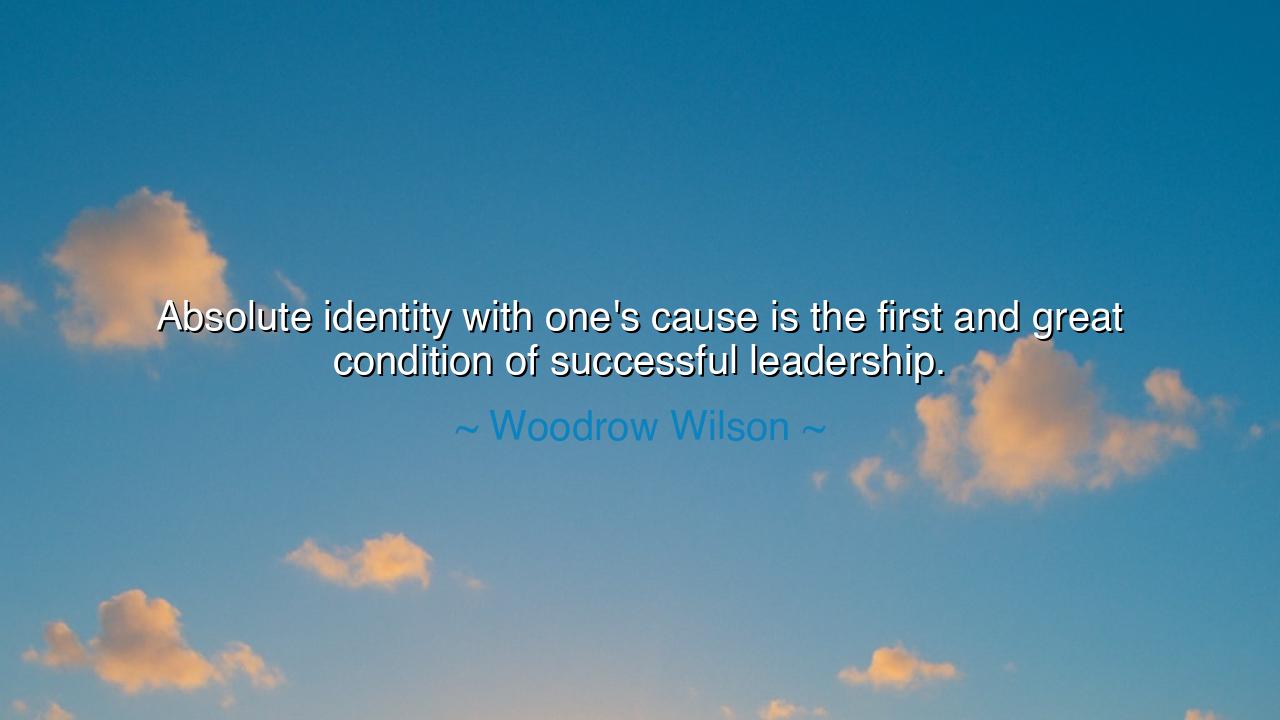
Absolute identity with one's cause is the first and great
Absolute identity with one's cause is the first and great condition of successful leadership.






Hear the words of Woodrow Wilson, who proclaimed with solemn weight: “Absolute identity with one’s cause is the first and great condition of successful leadership.” These words speak to the very heart of human struggle and triumph. For they remind us that no leader can guide others unless his soul burns wholly and without hesitation for the vision he serves. Leadership that is half-hearted crumbles; conviction that is divided scatters like dust in the wind. But when a man or woman becomes one with their cause, they are no longer simply individuals—they are the living embodiment of the truth they carry.
To have absolute identity with a cause is to live not for self but for something greater. It is to bind one’s destiny so tightly with a mission that the two cannot be separated. Such a leader does not merely speak of sacrifice; they breathe it. They do not merely call for perseverance; they themselves endure it. This is why Wilson named it the first condition of leadership—for without it, all other qualities, whether wisdom, eloquence, or power, are hollow shells. A leader without deep conviction is like a captain steering without stars: destined to lose both ship and crew.
History has shown us many such examples. Think of Joan of Arc, the peasant girl who believed utterly that she was chosen to deliver France. Her identity with her cause was so complete that kings listened to her, soldiers followed her, and enemies feared her. Though she perished in flames, her leadership outlived her, for it was born of conviction, not convenience. Her body was destroyed, but her cause lived, because she embodied it fully.
Another tale is that of Mahatma Gandhi, whose cause was the liberation of India through nonviolence. Gandhi did not merely preach simplicity and self-restraint—he wove it into every thread of his life, from his dress to his diet. His absolute identity with nonviolence gave him authority no sword could command. Millions followed him, not because he promised them ease, but because his very existence was proof of his devotion. His leadership was not imposed—it flowed from the visible unity between his life and his mission.
Wilson himself spoke these words from the furnace of political battle. As President of the United States during the Great War, he knew that only leaders who embodied their cause could withstand the storms of division, doubt, and despair. His call was not to shallow politicians or temporary opportunists, but to those who would bind their entire being to principle. For nations, like armies, follow not simply those who order them forward, but those who embody the very spirit of what is worth fighting for.
The meaning of Wilson’s words is clear: true leadership demands more than clever strategies or persuasive speeches. It requires the death of selfish ambition and the birth of total devotion to a mission greater than oneself. Only then can others trust, follow, and sacrifice, for they see in their leader not a wavering figure, but a living standard. The flame of conviction becomes a beacon by which others navigate their own fears.
The lesson for us is this: find your cause, and once you have found it, give yourself to it entirely. Do not drift between passing desires or half-hearted commitments. Choose the mission that awakens your spirit, and let it claim you. In your work, in your service, in your family, be wholly identified with what you believe is right. For if your life is fractured, your leadership will falter; but if your life is unified, your influence will endure beyond your days.
And what actions must you take? Begin by seeking clarity: what is the truth that stirs your heart, the principle for which you would endure hardship? Once it is found, live it out in word and deed. Do not ask others to believe what you yourself do not embody. Remember Joan, remember Gandhi, remember the great leaders of the ages—they prevailed because their lives and their causes were inseparable.
Thus let Wilson’s words echo across generations: “Absolute identity with one’s cause is the first and great condition of successful leadership.” Take them to heart, and let your life become the living vessel of your cause. For when leader and cause are one, even death cannot silence the vision, and the flame of conviction burns on in the hearts of those who follow.






AAdministratorAdministrator
Welcome, honored guests. Please leave a comment, we will respond soon